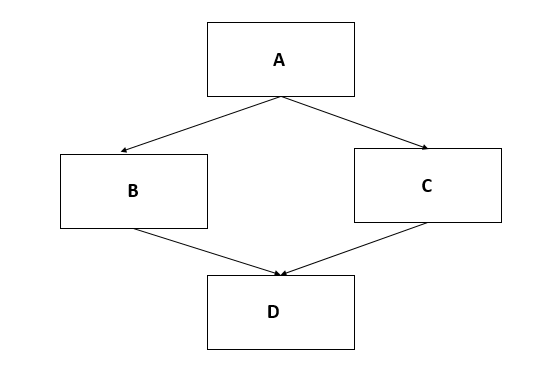Till Java 1.7, Java did not support multiple inheritance. Since Java 8, we can realize the concept of multiple inheritance through the use of default methods without getting into the diamond problem.
1. What is Multiple Inheritance?
In multiple inheritance, a child class can inherit the behavior from more than one parent classes. Note that a Java class can implement multiple interfaces, but an interface does not define concrete behavior rather, interfaces are used for defining the contracts only. So implementing multiple interfaces does not add the behavior to a class, so it is not multiple inheritance.
In the following diagram, class D extends classes A and B. In this way, D can inherit the non-private members of both classes. But, in Java, we cannot use extends keyword with two classes. So this kind of multiple inheritance is not possible in Java.

2. What are Default Methods?
If you have been in java programming for enough long time, you may realize how painful it can be to add a new method to an existing interface. We must implement that new method in all classes that implement the interface. It’s a really difficult job and often breaks the code and design. Well, Java 8 brought default methods to help solve this exact problem.
Default methods enable us to add new functionality to the interfaces and ensure backward compatibility for existing classes which implement that interface.
As their name implies, default methods in interfaces are methods that will be invoked by default – if not overridden in implementing classes. Let us understand with an example.
Moveable interface is an existing interface, and we want to add a new method moveFast(). If we add moveFast() method using the old technique, then all classes implementing Moveable will also be changed. So, let’s add moveFast() method as the default method.
public interface Moveable {
default void moveFast() {
System.out.println("I am moving fast");
}
}In this case, all the classes implementing Moveable interface do not need to change themselves (until some class specifically wants to override moveFast() method to add custom logic). All classes can directly call instance.moveFast() method.
class Animal implements Moveable { }
Animal tiger = new Animal();
//Call default method using instance reference
tiger.moveFast();We can add as many default methods in an interface as we want.
3. How is Multiple Inheritance achieved with Default Methods?
Since Java 8, the interfaces not only define the contracts but also contain the behavior using the default methods. So, if a class implements two interfaces and both define default methods, then the class essentially inherits behaviors from two parents which is multiple inheritance.
For example, in below code Animal class does not define any of its own behavior; rather, it inherits behavior from parent interfaces.
interface Moveable {
default void moveFast() {
System.out.println("I am moving fast");
}
}
interface Crawlable {
default void crawl(){
System.out.println("I am crawling");
}
}
public class Animal implements Moveable, Crawlable { }We can verify the behavior as follows:
Animal self = new Animal();
self.moveFast();
self.crawl();4. Possible Conflicts
In the above example, we have two different interfaces and two different methods – so there is no conflict. What if both interfaces decide to define a new method with the same name? Well, they can define without a problem. But which method will be invoked when Animal instance will call the method by name.
interface Moveable {
default void run() {
System.out.println("I am moving fast");
}
}
interface Crawlable {
default void run(){
System.out.println("I am crawling");
}
}
public class Animal implements Moveable, Crawlable { }Now what will happen when we call the animal.run() method?
Animal animal = new Animal();
animal.run();That’s a conflicting situation. To solve the above conflict, the caller class must decide which run() method it wants to invoke and then call using the interface’s reference.
Moveable.super.run(); //Call Moveable's run() method
//or
Crawlable.super.run(); //Call Crawlable's run() methodThat’s all you should know about the multiple inheritance feature in Java 8, using default methods.
Happy Learning !!

Comments